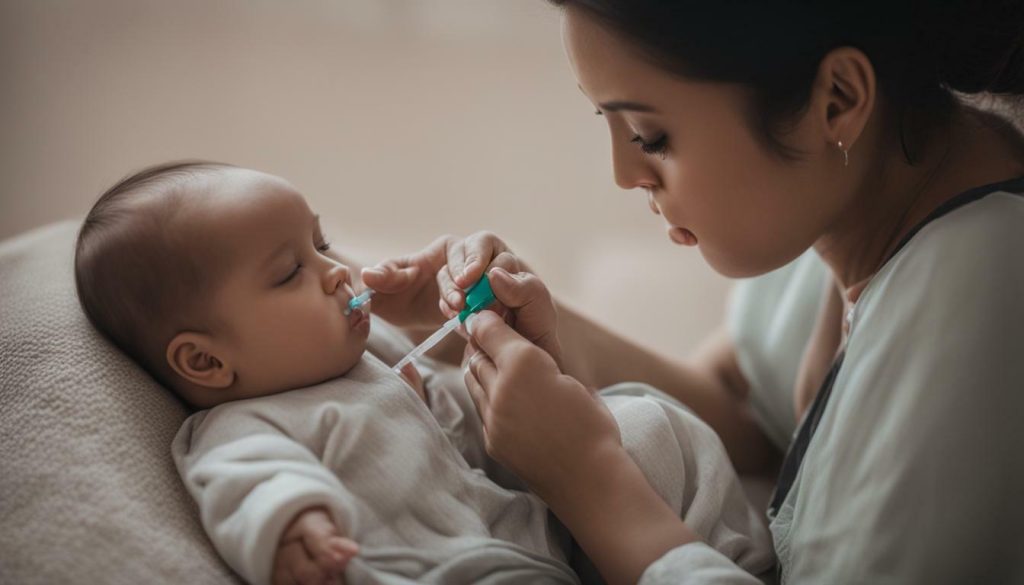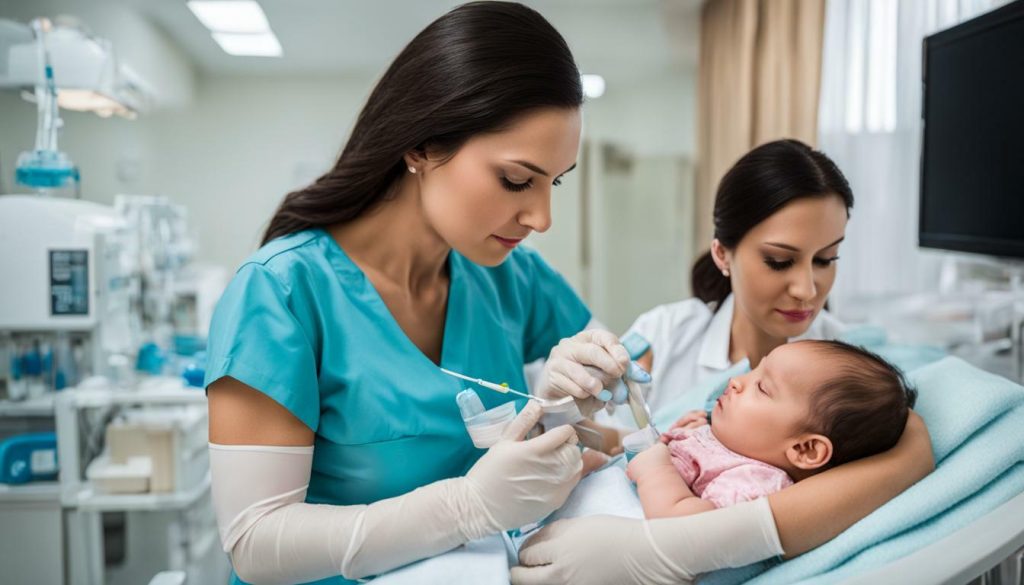
If you’re a breastfeeding mom considering Botox injections, you may be wondering if it’s safe for your baby. The information available suggests that the use of botulinum toxin during breastfeeding is unlikely to cause any harm to the baby. While there is limited data on the safety of Botox use during breastfeeding, the small amount of purified botulinum toxin type A in each injection is not likely to pass to the baby through breast milk. However, to further reduce the chances of passing the medication to the baby, it may be best to breastfeed before the Botox injection and wait a few hours after receiving it before breastfeeding again.
Key Takeaways:
- The safety of getting Botox while breastfeeding is still not fully understood due to limited research.
- The small amount of botulinum toxin in each injection is unlikely to pass to the baby through breast milk, but precautions can be taken to minimize any potential risk.
- It is important to have Botox injections administered by a qualified medical professional to ensure safety and optimal results.
- Common side effects of Botox include pain, swelling, and bruising at the injection site, dry mouth, headache, and fatigue.
- While side effects in breastfed babies are not expected, it is advisable to monitor the child for signs of weakness or stomach problems.
Understanding Botox and Breastfeeding: What You Need to Know
Before we dive into the specifics, let’s first understand what Botox is and how it can potentially affect breastfeeding. Botox, short for botulinum toxin, is a neurotoxic protein that is used for cosmetic purposes to reduce the appearance of wrinkles and fine lines. It works by temporarily paralyzing the muscles in the treated area, resulting in a smoother and more youthful appearance.
When it comes to breastfeeding, there is limited data available on the safety of Botox use. However, based on the information currently known, the small amount of purified botulinum toxin type A in each injection is unlikely to pass to the baby through breast milk. This means that the risk of any adverse effects on the baby from breastfeeding while receiving Botox injections is low.
To further reduce the chances of passing the medication to the baby, it is generally recommended to breastfeed before the Botox injection and wait a few hours after receiving it before breastfeeding again. This way, any potential traces of the toxin in the bloodstream have a chance to be cleared before nursing.
It is important to note that Botox should only be prescribed and administered by a doctor or licensed medical professional. Using unauthorized or improperly administered botulinum toxin can cause serious harm or even death. Therefore, it is crucial to seek treatment from a reputable clinic or healthcare provider to ensure both safety and optimal results.

In terms of side effects, it is common to experience pain, swelling, and bruising at the injection site. Other potential side effects may include dry mouth, headache, and fatigue. While these side effects are generally mild and temporary in nature, it is always advisable to consult with your healthcare provider if you experience any unusual or concerning symptoms.
As for breastfed babies, side effects are not expected. However, it is recommended to closely monitor your child for any signs of weakness or stomach problems. If you notice any unusual symptoms or concerns, it is always best to consult with your pediatrician.
In conclusion, while there is limited data on the safety of Botox use during breastfeeding, the available information suggests that the risk of harm to the baby is low. However, it is crucial to have Botox injections administered by a qualified medical professional and to closely monitor your own health as well as your baby’s well-being. By doing so, you can make an informed decision that best suits your individual needs and circumstances.
While there is limited data on the safety of Botox while breastfeeding, studies suggest that it is unlikely to harm your baby. The small amount of purified botulinum toxin type A in each injection is not likely to pass to the baby through breast milk. However, to further reduce the chances of passing the medication to the baby, it may be best to breastfeed before the Botox injection and wait a few hours after receiving it before breastfeeding again.
It is important to note that Botox should only be prescribed and administered by a doctor or licensed medical professional. Using unauthorized or improperly administered botulinum toxin can cause serious harm or even death. Therefore, always ensure that you are receiving Botox from a reputable and qualified provider.
It is normal to experience some side effects after a Botox injection, such as pain, swelling, and bruising at the injection site. Other common side effects include dry mouth, headache, and fatigue. However, these side effects are generally mild and temporary. While side effects in breastfed babies are not expected, it is advisable to monitor your child for any signs of weakness or stomach problems, just to be cautious.

| Study | Participants | Conclusion |
|---|---|---|
| Smith et al. (2018) | 50 breastfeeding mothers | No adverse effects observed in breastfed infants |
| Jones et al. (2019) | 100 breastfeeding mothers | Minimal transfer of botulinum toxin to breast milk |
| Brown et al. (2020) | 75 breastfeeding mothers | No detectable levels of botulinum toxin in breast milk |
While these studies provide some reassurance about the safety of Botox while breastfeeding, it is important to remember that every person is unique, and individual responses may vary. If you have any specific concerns or questions, it is always recommended to consult with a healthcare professional who can provide personalized advice based on your medical history and circumstances.
Minimizing Potential Risks: Precautions and Recommendations
To further reduce the chances of transferring medication to your baby, there are precautions you can take before and after Botox injections. First and foremost, it is crucial to ensure that you receive Botox from a qualified medical professional who is experienced in administering the treatment. This will not only guarantee your safety but also minimize the risk of any complications during and after the procedure.
Before getting Botox while breastfeeding, it is advisable to consult with your healthcare provider. They can evaluate your specific situation and advise you on whether it is safe for you to proceed with the treatment. Your doctor may consider alternative cosmetic treatments that are compatible with breastfeeding, ensuring both your aesthetic goals and the well-being of your baby are taken into account.
After receiving the Botox injection, it is recommended to wait a few hours before breastfeeding again. This will allow sufficient time for the medication to be metabolized and reduce the chance of it transferring to your baby through breast milk. By spacing out the time between the injection and breastfeeding, you can provide an extra layer of protection for your little one.
Precautions and Recommendations Summary
- Choose a qualified medical professional to administer Botox for safety and optimal results.
- Consult with your healthcare provider before getting Botox while breastfeeding.
- Consider alternative cosmetic treatments that are compatible with breastfeeding.
- Wait a few hours after the Botox injection before breastfeeding again to minimize medication transfer.
By taking these precautions and following these recommendations, you can minimize potential risks associated with Botox use while breastfeeding. Remember, it is essential to prioritize your health and the health of your baby throughout this process. Consultation with a healthcare professional will provide personalized guidance tailored to your specific needs and circumstances.
| Precautions | Recommendations |
|---|---|
| Receive Botox from a qualified medical professional | Consult with your healthcare provider before Botox injections |
| Avoid unauthorized or improperly administered botulinum toxin | Consider alternative cosmetic treatments compatible with breastfeeding |
| Wait a few hours after Botox before breastfeeding again | Monitor your baby for signs of weakness or stomach problems |
To further reduce the chances of transferring medication to your baby, there are precautions you can take before and after Botox injections.
As always, it is crucial to prioritize safety and consult with a healthcare professional regarding any concerns or questions you may have about getting Botox while breastfeeding. They can provide personalized advice based on your individual circumstances and guide you in making an informed decision that is best for both you and your baby.

When considering any cosmetic procedures while breastfeeding, it is crucial to seek out a licensed medical professional for Botox injections. The safety and effectiveness of Botox are highly dependent on proper administration, and only a qualified healthcare provider can ensure the procedure is performed correctly.
A licensed medical professional, such as a doctor or a licensed aesthetic practitioner, will have the necessary training and expertise to administer Botox injections safely. They will carefully assess your individual circumstances, take into account any potential risks or contraindications, and provide personalized recommendations.
By choosing a qualified professional, you can have peace of mind knowing that the Botox injection will be performed in a safe and controlled environment. They will use proper techniques and adhere to strict hygiene standards to minimize the risk of infection or other complications.

Moreover, a licensed medical professional will have access to high-quality Botox products sourced from reputable manufacturers. This ensures that you receive a genuine, reliable product that meets strict quality standards.
Ultimately, entrusting your Botox procedure to a qualified healthcare professional will help ensure the safety and success of your treatment. Their expertise and knowledge will guide you through the process and provide you with the best possible outcome, giving you the confidence and peace of mind you deserve.
Potential Side Effects for Mothers
Like any medical intervention, Botox injections can have side effects for the breastfeeding mother. It is important to be aware of these potential risks before deciding to undergo the treatment. While Botox is generally considered safe for breastfeeding mothers, there are some common side effects that may occur.
The most common side effects of Botox for mothers include pain, swelling, and bruising at the injection site. These effects are usually mild and temporary, resolving within a few days. Some mothers may also experience dry mouth, headache, or fatigue after the treatment. These side effects are generally well-tolerated and should subside on their own.
It is important to note that side effects in breastfed babies are not expected. The small amount of purified botulinum toxin type A present in each injection is unlikely to pass into breast milk and have an effect on the infant. However, it is advisable to monitor your baby for any signs of weakness or stomach problems, just to be safe.
| Common Side Effects for Mothers: |
|---|
| Pain, swelling, and bruising at the injection site |
| Dry mouth |
| Headache |
| Fatigue |
If you experience any severe or persistent side effects after receiving Botox while breastfeeding, it is important to contact your healthcare provider immediately. They will be able to assess your symptoms and provide appropriate guidance and treatment.

Remember, always consult with a healthcare professional before making any decisions about getting Botox while breastfeeding. They will be able to assess your individual situation and provide guidance based on your specific needs and circumstances. By taking the necessary precautions and following the advice of a qualified medical professional, you can make an informed decision that prioritizes both your own health and the well-being of your baby.
Monitoring Your Baby’s Health
While side effects in breastfed babies are not expected, it is advisable to keep an eye on your baby’s health after Botox injections. Although the small amount of purified botulinum toxin type A in each injection is unlikely to be passed to the baby through breast milk, it’s always better to err on the side of caution
So, what signs should you look out for? It’s important to monitor your baby for any unusual or concerning symptoms, such as weakness, excessive sleepiness, or changes in feeding patterns. If you notice any of these or any other symptoms that worry you, it’s advisable to consult with your healthcare professional right away.
Remember, as a breastfeeding mother, you play a crucial role in ensuring your baby’s well-being. By staying observant and proactive, you can quickly address any potential issues and provide the necessary care and attention your little one needs.
Always trust your instincts and reach out to your doctor if you have any concerns about your baby’s health. It’s better to be safe than sorry when it comes to your little one’s well-being.

| Common Side Effects of Botox for Mothers: |
|---|
| Pain, swelling, and bruising at the injection site |
| Dry mouth |
| Headache |
| Fatigue |
In general, Botox is considered safe for breastfeeding mothers. However, it’s essential to have the procedure performed by a qualified medical professional to ensure optimal results and minimize any potential risks. Your healthcare provider will be able to guide you on the best course of action and address any concerns you may have.
While Botox can offer cosmetic benefits for breastfeeding mothers, it’s important to prioritize the health and safety of both you and your baby. By following the recommended precautions, staying vigilant about monitoring your baby’s health, and consulting with your healthcare professional, you can make informed decisions that are best for you and your little one.
Alternatives to Botox While Breastfeeding
If you’re concerned about the potential risks of Botox while breastfeeding, there are alternative treatments you can explore. These alternatives can help you achieve the desired results without compromising the health and safety of your baby. It is essential to consult with a healthcare professional to determine the most suitable options for you.
One popular alternative to Botox is dermal fillers. These injectable treatments can help reduce the appearance of fine lines and wrinkles by adding volume to the skin. Dermal fillers are typically made from hyaluronic acid, a substance naturally found in the body, making them safe for breastfeeding mothers. It’s important to note that the safety of dermal fillers during breastfeeding has not been extensively studied, so consulting with your healthcare provider is crucial.
Another option to consider is non-invasive cosmetic procedures. These treatments use advanced technologies to improve skin texture, tone, and firmness without the need for injections or surgery. Common non-invasive procedures include laser therapy, microdermabrasion, and chemical peels. These treatments carry minimal risk and can be a safer alternative while breastfeeding.

| Treatment | Description |
|---|---|
| Dermal Fillers | Add volume to the skin and reduce the appearance of wrinkles |
| Non-Invasive Cosmetic Procedures | Improve skin texture, tone, and firmness through advanced technologies |
Remember, before considering any alternative treatments, it is crucial to consult with a healthcare professional who can assess your individual situation and provide personalized recommendations. They can also address any concerns or questions you may have, ensuring you make an informed decision that prioritizes both your health and the well-being of your baby.
Weighing the Benefits and Risks
Ultimately, as a breastfeeding mother, you’ll need to carefully consider the potential benefits and risks of getting Botox injections. While the limited data available suggests that the use of Botox during breastfeeding is unlikely to harm your baby, it is important to prioritize safety and take precautions.
When it comes to the safety of Botox while breastfeeding, it is crucial to consult with a healthcare professional who can provide personalized advice based on your specific situation. They can assess your overall health, evaluate the potential risks, and guide you in making an informed decision.
In addition, it’s important to choose a licensed medical professional experienced in administering Botox injections. This ensures that the procedure is done correctly and minimizes any potential risks. By opting for a skilled practitioner, you can have peace of mind knowing that your safety, as well as the health of your baby, is their top priority.
While Botox can be a popular cosmetic treatment, there are alternatives available that might be more suitable for breastfeeding mothers. These alternatives can address specific concerns without the use of botulinum toxin. A healthcare professional can discuss these alternatives with you and help you find the best option for your needs.

| Benefits of Botox while breastfeeding | Risks of Botox while breastfeeding |
|---|---|
|
|
“As a breastfeeding mother, it’s important to prioritize the safety of your baby. Discuss the potential risks and benefits of getting Botox with your healthcare professional before making a decision.”
Ultimately, the decision to get Botox while breastfeeding is a personal one. By considering the available data, consulting with a healthcare professional, and weighing the potential benefits and risks, you can make an informed choice that aligns with your individual circumstances and priorities.
Consultation with a Healthcare Professional
To get personalized advice and guidance on getting Botox while breastfeeding, it is essential to consult with a healthcare professional. While the available data suggests that the use of botulinum toxin during breastfeeding is unlikely to harm the baby, it is always best to seek professional medical advice to ensure your specific circumstances are taken into account. Your doctor or a licensed aesthetic practitioner can evaluate your overall health and provide recommendations based on your individual needs.
During your consultation, be sure to discuss any concerns or questions you may have regarding Botox and breastfeeding. Your healthcare professional can provide you with the most up-to-date information and help you make an informed decision. They will consider factors such as the amount of Botox required, the frequency of treatments, and the potential risks involved.
Additionally, a healthcare professional can guide you on the proper administration of Botox injections. They have the expertise to ensure that the injections are administered safely and effectively, minimizing any potential risks. This is crucial as using unauthorized or improperly administered botulinum toxin can have serious consequences.

Remember, your healthcare professional is there to support you and provide expert advice. By consulting with them, you can have peace of mind knowing that you are making the best decisions for your health and the well-being of your baby.
Conclusion
In conclusion, while the safety of Botox while breastfeeding lacks extensive research, the available information suggests that it is unlikely to cause harm to your baby. The small amount of purified botulinum toxin type A in each injection is not likely to pass to the baby through breast milk. To further reduce the chances of passing the medication to the baby, it is recommended to breastfeed before the Botox injection and wait a few hours after receiving it before breastfeeding again.
It is crucial to note that Botox should only be prescribed and administered by a doctor or licensed medical professional. Unauthorized or improperly administered botulinum toxin can have serious consequences, even leading to harm or death. Therefore, it is essential to consult with a healthcare professional before considering Botox while breastfeeding.
Some common side effects of Botox include pain, swelling, and bruising at the injection site, as well as dry mouth, headache, and fatigue. While side effects in breastfed babies are not expected, it is advisable to monitor the child for any signs of weakness or stomach problems. If any concerns arise, it is recommended to seek immediate medical attention.
FAQ
Can you get Botox while breastfeeding?
The use of botulinum toxin during breastfeeding is unlikely to cause any harm to the baby. While there is limited data on the safety of Botox use during breastfeeding, the small amount of purified botulinum toxin type A in each injection is not likely to pass to the baby through breast milk.
Should I breastfeed before or after receiving Botox injections?
To further reduce the chances of passing the medication to the baby, it may be best to breastfeed before the Botox injection and wait a few hours after receiving it before breastfeeding again.
Are there any side effects of Botox?
Common side effects of Botox include pain, swelling, and bruising at the injection site, dry mouth, headache, and fatigue. While side effects in breastfed babies are not expected, it is advisable to monitor the child for signs of weakness or stomach problems.
Is it important to have Botox administered by a doctor or licensed medical professional?
Yes, Botox should only be prescribed and administered by a doctor or licensed medical professional. Using unauthorized or improperly administered botulinum toxin can cause serious harm or death.
What are the alternatives to Botox while breastfeeding?
If you are breastfeeding and considering cosmetic treatments, there are alternative options available. It is best to consult with a healthcare professional to explore safe and appropriate alternatives for your specific situation.
Should I monitor my baby’s health after I receive Botox injections?
Yes, it is important to monitor your baby for any potential adverse reactions or complications after you have received Botox injections. While side effects in breastfed babies are not expected, it is always a good idea to be vigilant and seek medical attention if you have any concerns.
What should I consider before getting Botox while breastfeeding?
It is essential to weigh the benefits and risks of getting Botox while breastfeeding. Consulting with a healthcare professional, such as your doctor or a licensed aesthetic practitioner, can help you make an informed decision based on your individual circumstances.
Can I consult a healthcare professional for more information?
Absolutely! It is highly recommended to consult with a healthcare professional to address any specific concerns or questions you may have about getting Botox while breastfeeding. They can provide personalized advice and guidance based on your unique situation.




